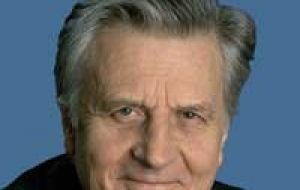MercoPress. South Atlantic News Agency
Euro zone with zero inflation and growing fears of deflation
 ECB Trichet faces the challenge of “negative inflation” for several months
ECB Trichet faces the challenge of “negative inflation” for several months The Euro zone annual inflation rate in the 16-country region fell to 0% in May from April’s 0.6%, according to Euro-stat. Economists said inflation would turn negative in June, --deflation—further complicating the task of the European Central Bank as it attempts to combat the worst economic downturn for half a century.
The worry for the ECB will be that below-zero inflation rates will stoke fears of full-blown deflation – generalized and persistent falls in prices that wreak significant economic damage.
However ECB president Jean Claude Trichet addressing a finance conference in Morocco said that expectations for long-term inflation in the Euro zone remain on target and it is not yet clear when the downturn in emerging markets will bottom out.
“Long-term inflation expectations in the Euro-area, whether based on surveys or extracted from financial indicators, have been and continue to be firmly anchored at levels consistent with our definition of price stability”.
The ECB quantitative definition of price stability is an inflation rate of below but close to 2%.
Earlier in the month Trichet warned that Euro-zone inflation was likely to be negative “for some months”. He argued recent falls reflected the statistical effects of last year’s oil price rises and forecast a pick up in inflation later this year.
But the latest inflation data were weaker than expected and economists believe the recession will reduce inflationary forces further in coming months.
“The severe contraction in activity has created a huge margin of space capacity in the economy, which will exert strong downward pressure on core prices” said Martin van Viet at ING bank. “There remains a real risk that the Euro-zone will see more than a whiff of deflation.”
“There seems little doubt that the Euro-zone will see deflation in June and that it will persist over the next few months at least,” said Howard Archer at IHS Global Insight.
The ECB cut its main interest rate by 325 basis points since last October to 1%, the lowest ever, and is not expected to announce any change after its meeting next week.
But it has followed the US Federal Reserve and Bank of England in announcing an emergency asset purchase program to help revive financial markets. The ECB will next week announce details of its plans to buy 60 billion Euros billion in “covered bonds, which are issued by banks and backed by public sector loans and mortgages”.
“We expect to engage in a program of around 60 billion euros that targets an important segment of the private securities market which has been particularly affected by financial market turbulence” anticipated Trichet.




Top Comments
Disclaimer & comment rulesCommenting for this story is now closed.
If you have a Facebook account, become a fan and comment on our Facebook Page!